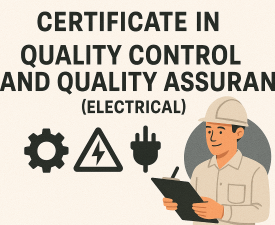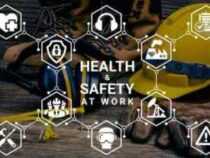Description
Course Name: Certificate in Quality Control and Quality Assurance (Electrical)
Course Id: CIQCQAE/Q0101.
Eligibility: Graduation or equivalent is required.
Objective: The Certificate in Quality Control and Quality Assurance (Electrical) course aims to build essential competencies for ensuring the quality, safety, and compliance of electrical systems, components, and installations in industrial and commercial settings.
Duration: Three Months.






Debit/Credit Card, Wallet, Paytm, Net Banking, UPI, or Google Pay.



• A soft copy (scanned) of your certificate via email within 7 days of examination.
• A hard copy (original with official seal and signature) sent to your address within 45 day of declaration of result.

Online Examination Detail:
Duration- 60 minutes.
No. of Questions- 30. (Multiple Choice Questions).
Maximum Marks- 100, Passing Marks- 40%.
There is no negative marking in this module.
| Marking System: | ||||||
| S.No. | No. of Questions | Marks Each Question | Total Marks | |||
| 1 | 10 | 5 | 50 | |||
| 2 | 5 | 4 | 20 | |||
| 3 | 5 | 3 | 15 | |||
| 4 | 5 | 2 | 10 | |||
| 5 | 5 | 1 | 5 | |||
| 30 | 100 | |||||
| How Students will be Graded: | ||||||
| S.No. | Marks | Grade | ||||
| 1 | 91-100 | O (Outstanding) | ||||
| 2 | 81-90 | A+ (Excellent) | ||||
| 3 | 71-80 | A (Very Good) | ||||
| 4 | 61-70 | B (Good) | ||||
| 5 | 51-60 | C (Average) | ||||
| 6 | 40-50 | P (Pass) | ||||
| 7 | 0-40 | F (Fail) | ||||







Syllabus:
Module 1: Introduction to Electrical QA/QC and Standards
Basics of quality control and quality assurance in electrical systems, Difference between QA and QC, Importance of QA/QC in electrical projects, Overview of electrical systems in industries, Electrical safety regulations and standards (IEC, BIS, IEEE), Quality planning in electrical works, Role and responsibilities of an electrical QA/QC technician, Common electrical quality failures and their impacts, Compliance with national electrical codes, Introduction to inspection test plans (ITP).
Module 2: Electrical Materials Inspection and Testing
Inspection of electrical cables and wires, Testing of switchgear and circuit breakers, Transformer quality checks, Cable insulation and continuity testing, Verification of electrical panels and enclosures, Testing of protective devices (MCBs, RCCBs), Acceptance criteria for electrical components, Vendor inspection and third-party certifications, Material traceability and tagging, Documentation of incoming material inspection.
Module 3: Installation Quality Control and Site Supervision
Cable laying techniques and QA parameters, Panel installation and earthing verification, Busbar installation inspection, Junction box and control panel wiring standards, Cable termination and gland fitting inspection, Lighting and power system installation checks, QA during conduit and trunking installation, Earthing and lightning protection QA checks, Site inspection reports and photographic evidence, Adherence to site safety and quality protocols.
Module 4: Electrical Testing and Commissioning QA
Pre-commissioning electrical tests, Insulation resistance test (megger), Earth resistance testing, High voltage withstand test (HiPot), Functional testing of electrical systems, Loop checking and continuity tests, Voltage and current measurement validation, Load testing and verification, QA during synchronization of systems, Commissioning documentation and sign-off procedures.
Module 5: Documentation and Quality Management Systems
Preparation of QA/QC checklists and formats, Method statements and work procedures, Calibration of electrical test instruments, Non-conformance reporting (NCR) and corrective action, Daily QA reports and site logs, Internal and external audits in electrical QA, Maintaining records of electrical drawings and revisions, Compliance with ISO 9001 and project-specific standards, Material and test certificates documentation, Handover dossiers and quality clearance.
Module 6: Advanced QA Practices and Professional Skills
Introduction to Six Sigma and Lean in electrical QA, Root cause analysis and failure investigation, Case studies of electrical QA/QC failures, Use of digital tools and QA software, Integration of Building Management Systems (BMS) and QA protocols, Renewable energy systems QA checks (solar panels, inverters), Soft skills for QA professionals (communication, reporting), Coordination with other departments (civil, mechanical, safety), Continuous improvement in electrical quality practices, Career growth in electrical QA/QC domain.
⚡ Certificate in Quality Control and Quality Assurance (Electrical)
This certificate program equips students with the skills needed to perform quality inspections, testing, calibration, and assurance in electrical systems, equipment, and components, across manufacturing, infrastructure, energy, and industrial sectors.
🎓 Career Opportunities in Electrical QA/QC
1. Electrical Quality Control Inspector
-
Role: Inspect wiring, panels, motors, and electrical installations for quality and compliance.
-
Industries: Construction, Power Plants, Electrical EPC
-
Salary: ₹2.5 – ₹5 LPA (Fresher), ₹6 – ₹9 LPA (Experienced)
2. Quality Assurance Engineer (Electrical)
-
Role: Monitor and enforce quality standards in electrical manufacturing processes.
-
Industries: Transformers, Switchgear, Cable Manufacturing
-
Salary: ₹3 – ₹6.5 LPA
3. Electrical Testing and Commissioning Technician
-
Role: Perform testing, troubleshooting, and commissioning of electrical equipment on site.
-
Industries: Infrastructure Projects, Metro, Smart Grids
-
Salary: ₹3 – ₹5.5 LPA
4. Calibration Technician (Electrical Instruments)
-
Role: Calibrate and maintain measuring devices like multimeters, voltage testers, etc.
-
Industries: Testing Labs, Industrial QA/QC Units
-
Salary: ₹2 – ₹4.5 LPA
5. Electrical Safety & Compliance Officer
-
Role: Ensure safety protocols and electrical standards (e.g., IS, IEC) are followed.
-
Industries: Manufacturing, Facilities Management, Government Projects
-
Salary: ₹3.5 – ₹7 LPA
6. Panel QA Inspector
-
Role: Inspect and test control panels, switchboards, and PLC panels before dispatch.
-
Industries: Panel Manufacturing, Automation
-
Salary: ₹2.5 – ₹5 LPA
7. Field QA/QC Engineer
-
Role: Inspect electrical installations, wiring systems, and cable routing at construction sites.
-
Industries: Railways, Metro, Airports, Real Estate
-
Salary: ₹3 – ₹6 LPA
8. Electrical Maintenance QA Assistant
-
Role: Verify quality standards during preventive and corrective maintenance.
-
Industries: Steel, Cement, Fertilizer Plants
-
Salary: ₹2.5 – ₹4.5 LPA
🏭 Industries Hiring
-
Electrical Equipment Manufacturing
-
Construction & Infrastructure (Metro, Rail, Roads)
-
Power Plants & Distribution Companies
-
Smart City & Renewable Energy Projects
-
Automotive & Heavy Engineering
-
Facilities Management Firms
-
Public Sector Units (PSUs)
📈 Career Growth Path
| Level | Position | Salary Range (₹) |
|---|---|---|
| Entry | QA Assistant, QC Technician | ₹2.5 – ₹4.5 LPA |
| Mid-Level | QA/QC Engineer, Testing Technician | ₹4 – ₹7.5 LPA |
| Senior | QA/QC Manager, Electrical Compliance Officer | ₹8 – ₹15+ LPA |







Reviews
There are no reviews yet.